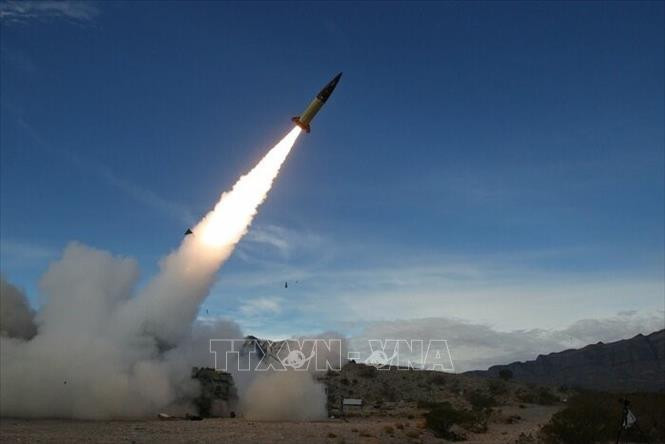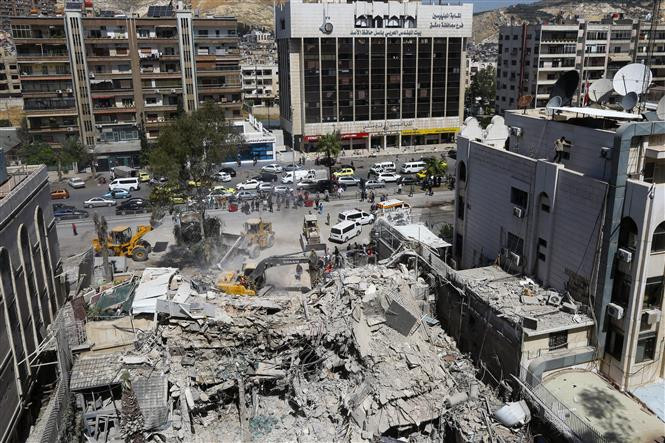After the US drone strike that killed General Soleimani in 2020, Iran launched missile strikes against US bases in the region. But this time, despite retaliating for the deaths of less prominent commanders, Tehran struck on a larger scale.

After the US drone strike that killed General Soleimani in 2020, Iran launched missile strikes against US bases in the region. But this time, despite retaliating for the deaths of less prominent commanders, Tehran struck on a larger scale.
Iran’s latest attack against Israel is raising fears of a regional war engulfing the Middle East, Foreign Policy reported. On the evening of April 13 (local time), Iran launched hundreds of drones and many cruise missiles, ballistic missiles, towards Israeli territory. The country also seized an Israel-linked container ship in the Strait of Hormuz. Tehran considered the attack as retaliation for the airstrike that assassinated several senior commanders of the Islamic Revolutionary Guard Corps (IRGC), including General Mohammad Reza Zahedi, in Damascus, Syria on April 1, which they accused Israel of carrying out.
Iran’s attack on Israel reportedly involved more than 300 drones, cruise missiles, and ballistic missiles. That’s significantly more than the 15 ballistic missiles Iran fired at Ayn al-Asad Air Base and Erbil International Airport in Iraq in retaliation for the US killing of General Qassem Suleimani, the head of the IRGC’s elite Quds Force, in January 2020. That discrepancy raises a number of points.
First of all, revenge for the death of General Suleimani is nothing more than restoring Iran’s honor. The fact that the US administration at that time ordered the killing of an important and famous figure like Mr. Suleimani required some kind of response from Iran, but Tehran remained cautious to avoid an escalating war with the US.
Meanwhile, those killed in the Israeli attack on the Iranian embassy complex in Damascus on April 1 were not as famous or powerful as General Suleimani, but Tehran’s retaliation was larger and more sophisticated. The difference suggests that this response was about more than honor: it was also about some element of deterrence.
Iran is well aware of the size and capabilities of Israel’s air defenses. The scale of the attack was almost certainly designed to allow at least some of the projectiles to penetrate those defenses and cause some damage. Their failure to do so is certainly a disappointment to Tehran, but the Iranians can probably take solace in the fact that the attack frightened the Israeli people and alarmed their government. Iran probably hopes that it was unsettling enough to give Israeli leaders pause the next time they consider an action similar to the attack on the embassy in Damascus.

First, Iran could have launched significantly more missiles—not in greater numbers, but perhaps at least twice as many—without exhausting its stockpile of long-range assets. Second, initial reports indicated that the attack was supposed to have been focused on just one or a few military targets, including an Israeli air base outside Beersheba, suggesting a significant degree of caution on Iran’s part. The missiles could have been launched toward Tel Aviv or Haifa, where any impact would have been more likely to kill Israeli civilians.
Third, Hezbollah is not involved. Hezbollah is considered the trump card in the pro-Iran forces. With more than 150,000 rockets and missiles, the Lebanese militant group can overwhelm Israel’s air defenses. But a large-scale attack by Hezbollah could trigger an all-out war with Israel, something Hezbollah is trying to avoid. Tehran will only use Hezbollah’s card if what it does is extremely important.
All of this reinforces the strategic assessment that Iran does not want to escalate with Israel and is in fact doing its utmost to avoid it. Despite Israel’s heavy-handed attack on Iran’s ally Hamas, the war in Gaza has so far proceeded without a response from Tehran. Israel was badly hurt in the Hamas offensive on October 7, 2023, plans for Israel-Saudi Arabia normalization have stalled, and much of the Middle East and the wider world blames Israel and the United States for all of it. There is no reason for Iran’s leadership to jeopardize all of that by giving Israel (or the United States) a justification to inflict major damage on Tehran.
Moreover, the Iranian regime is facing significant economic challenges, coupled with widespread protests and violence from the Balochi minority. In addition, Iran’s military is widely viewed as outgunned and would likely lose a full-scale confrontation with Israel, let alone the United States, which is almost certain. A regional war that Iran could lose is a risky proposition for a country already in dire straits.
But Iran has crossed a line, though it may not admit it. Iran had never attacked Israel directly from its own territory before April 13. Israel had never openly attacked Iranian territory—all of its attacks on Iran have been military strikes against Iranians in Syria, Lebanon, and elsewhere, or covert attacks on Iranian territory that Israel has not acknowledged in what it calls a “shadow war.” This is a recognized, indeed heavily publicized, military attack on Israel from Iran. It could open the door for Israel to do the same, perhaps even inflicting more damage on Iran than Tehran can inflict on Tel Aviv.